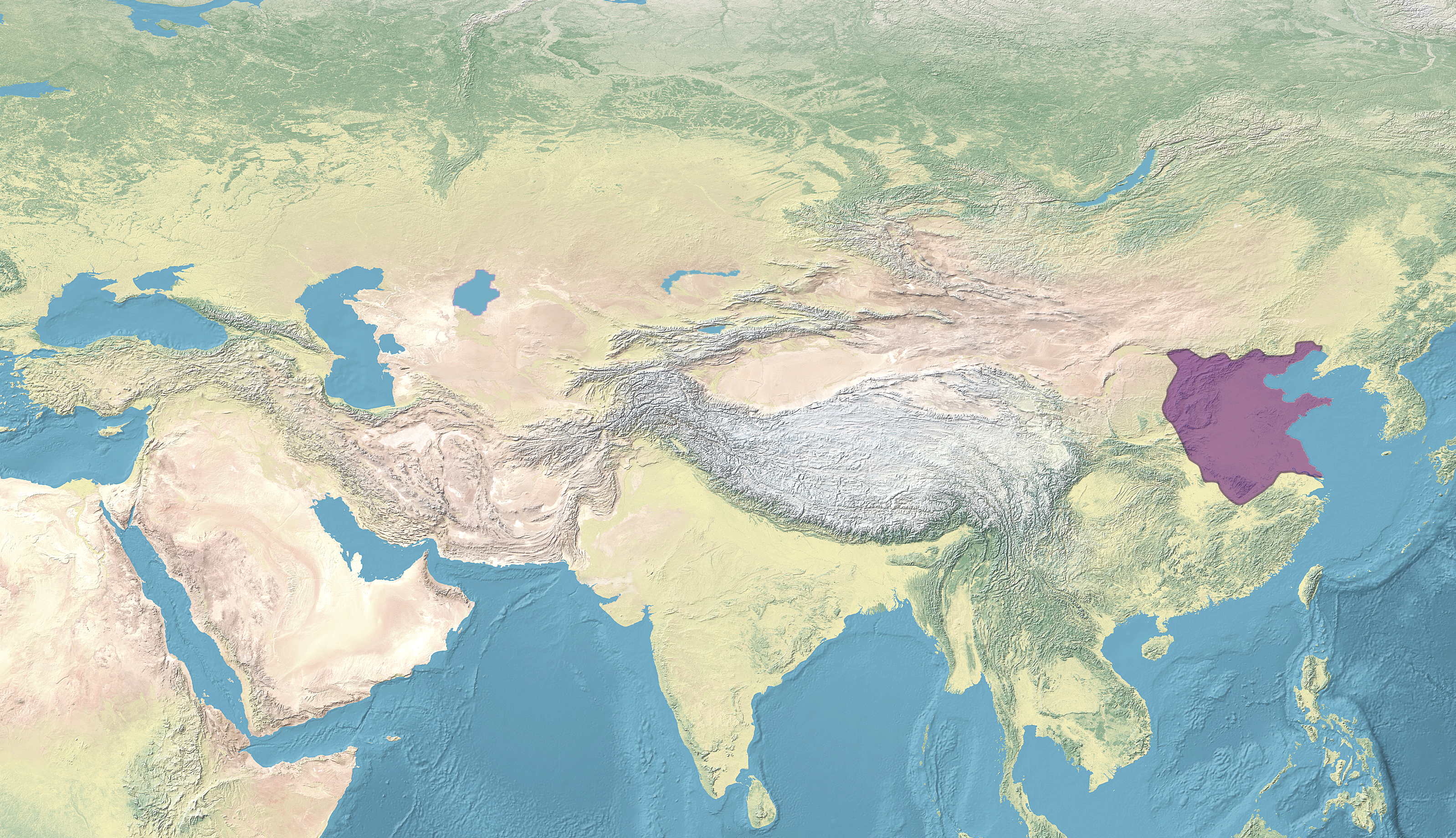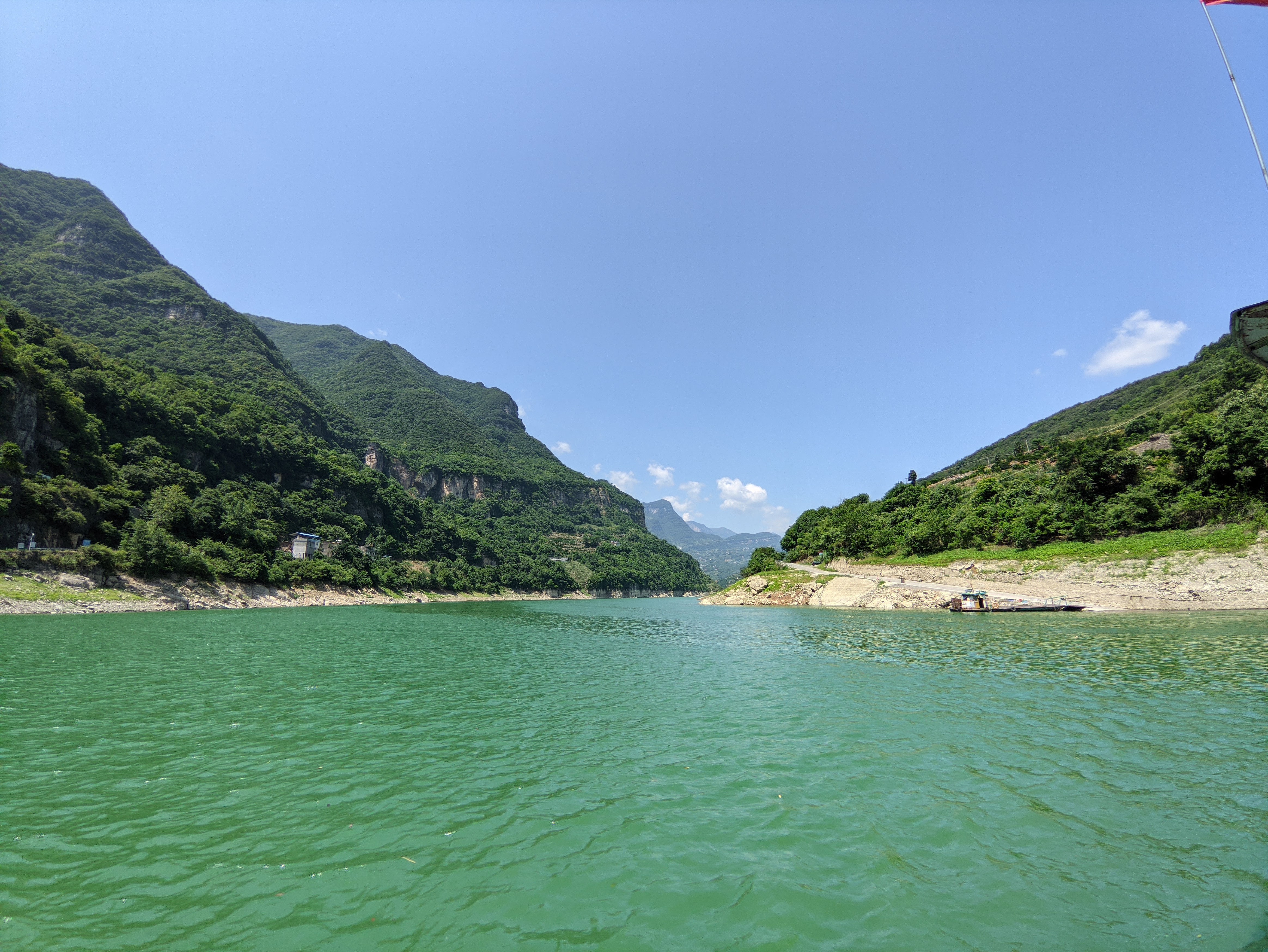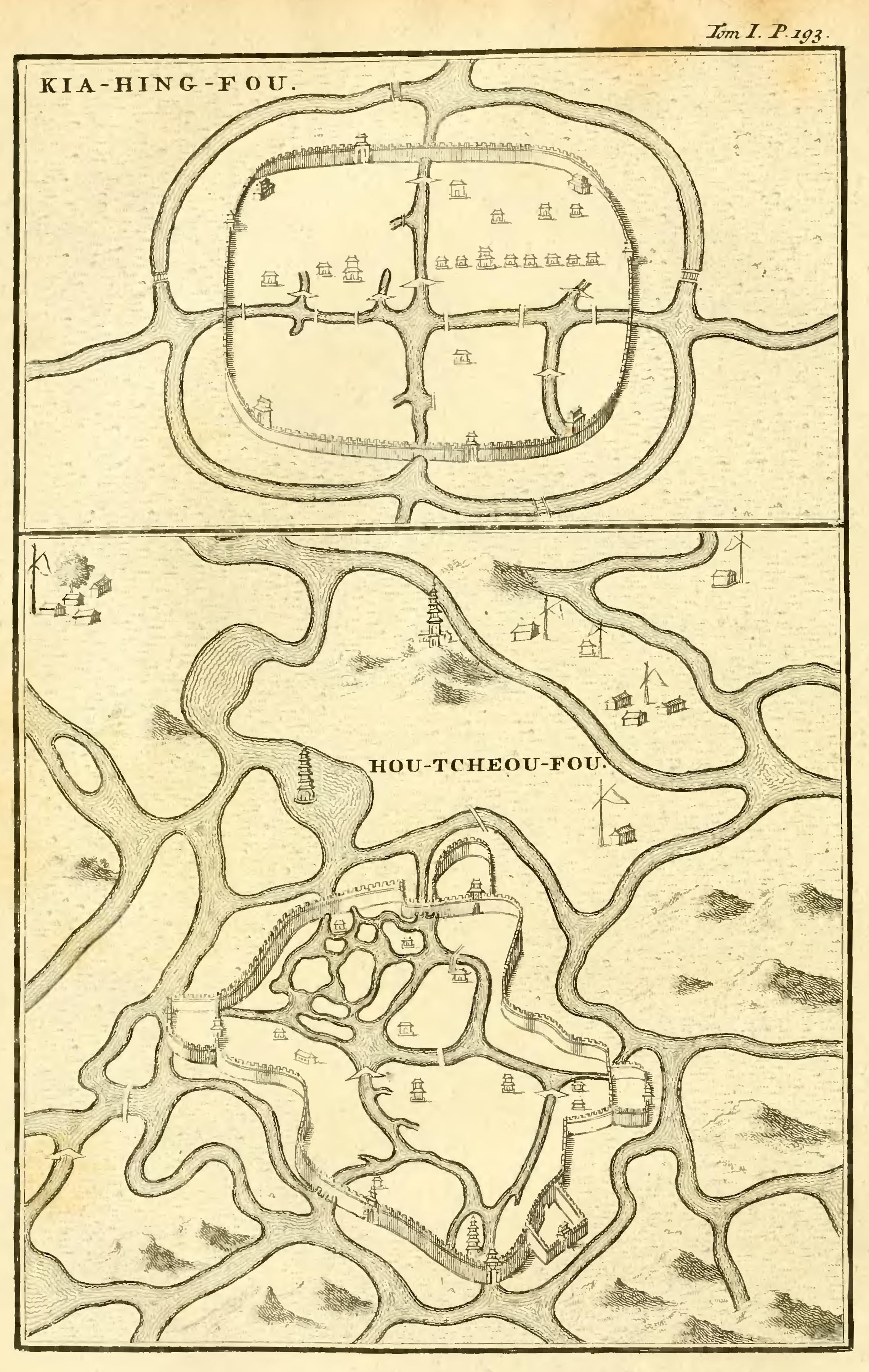|
Emperor Wen Of Chen
Emperor Wen of Chen (陳文帝) (522 – 31 May 566), personal name Chen Qian (陳蒨), also called Chen Tanqian (陳曇蒨),《 新唐書·宰相世系表》 courtesy name Zihua (子華), was the second emperor of the Chinese Chen dynasty. He was a nephew of the founding monarch, Emperor Wu (Chen Baxian), and after Emperor Wu's death in 559, the officials supported him to be emperor since Emperor Wu's only surviving son, Chen Chang, was detained by the Northern Zhou dynasty. At the time he took the throne, Chen had been devastated by war during the preceding Liang dynasty, and many provinces nominally loyal to him were under control of relatively independent warlords. During his reign, he consolidated the state against warlords, and he also seized territory belonging to claimants to the Liang throne, Xiao Zhuang and the Emperor Xuan of Western Liang, greatly expanding Chen's territory and strength. During Liang Dynasty Chen Qian was born in 522, as the oldest son of Chen D ... [...More Info...] [...Related Items...] OR: [Wikipedia] [Google] [Baidu] |
Tang Dynasty
The Tang dynasty (, ; zh, c=唐朝), or the Tang Empire, was an Dynasties of China, imperial dynasty of China that ruled from 618 to 907, with an Wu Zhou, interregnum between 690 and 705. It was preceded by the Sui dynasty and followed by the Five Dynasties and Ten Kingdoms period. Historians generally regard the Tang as a high point in Chinese civilisation, and a Golden age (metaphor), golden age of cosmopolitan culture. Tang territory, acquired through the military campaigns of its early rulers, rivalled that of the Han dynasty. The House of Li, Li family founded the dynasty after taking advantage of a period of Sui decline and precipitating their final collapse, in turn inaugurating a period of progress and stability in the first half of the dynasty's rule. The dynasty was formally interrupted during 690–705 when Empress Wu Zetian seized the throne, proclaiming the Wu Zhou dynasty and becoming the only legitimate Chinese empress regnant. The An Lushan rebellion (755 ... [...More Info...] [...Related Items...] OR: [Wikipedia] [Google] [Baidu] |
Xiao Zhuang
Xiao Zhuang (蕭莊; 548–577?), often known by his princely title of Prince of Yongjia (永嘉王), was a grandson of Emperor Yuan of Liang, who was declared by the general Wang Lin to be the legitimate emperor of the Liang dynasty in 558, under military assistance by Northern Qi. He thus was one of the three claimants to the Southern dynasties throne, competing with Emperor Xuan of Western Liang, who was supported by Northern Zhou, and the Chen dynasty's founder Emperor Wu of Chen and later his nephew Emperor Wen of Chen. In 560, with Wang Lin defeated by Chen troops, both Wang and Xiao Zhuang fled to Northern Qi, ending their rivalry with Chen and the Western Liang. While Northern Qi emperors made promises to return Xiao Zhuang to the Liang throne, Northern Qi was never able to accomplish that promise, and Xiao Zhuang died shortly after Northern Qi's own destruction in 577. Early life Xiao Zhuang was born in 548, as the son of Xiao Fangdeng (), the oldest son and heir ... [...More Info...] [...Related Items...] OR: [Wikipedia] [Google] [Baidu] |
Northern Qi
Qi, known as the Northern Qi (), Later Qi (後齊) or Gao Qi (高齊) in historiography, was a Dynasties in Chinese history, Chinese imperial dynasty and one of the Northern and Southern dynasties#Northern dynasties, Northern dynasties during the Northern and Southern dynasties era. It ruled the eastern part of northern China from 550 to 577. The dynasty was founded by Emperor Wenxuan of Northern Qi, Gao Yang (Emperor Wenxuan), and was eventually conquered by the Xianbei-led Northern Zhou, Northern Zhou dynasty in 577. History Northern Qi was the successor state of the Chinese Xianbei state of Eastern Wei and was founded by Emperor Wenxuan of Northern Qi, Emperor Wenxuan. Emperor Wenxuan had a Han Chinese, Han father of largely Xianbei culture, Gao Huan, and a Xianbei mother, Lou Zhaojun. As Eastern Wei's powerful minister Gao Huan was succeeded by his sons Gao Cheng and Gao Yang, who took the throne from Emperor Xiaojing of Eastern Wei in 550 and established Northern Qi as Emper ... [...More Info...] [...Related Items...] OR: [Wikipedia] [Google] [Baidu] |
Emperor Jing Of Liang
Emperor Jing of Liang (; 543 – 5 May 558), personal name Xiao Fangzhi (), courtesy name Huixiang (), nickname Fazhen (), was an emperor of the Chinese Liang Dynasty. As the only surviving son of Emperor Yuan, he was declared emperor by the general Chen Baxian in 555, but in 557 Chen forced him to yield the throne and established Chen Dynasty. In 558, Chen had him killed. Background Xiao Fangzhi was born in 544, when his father Xiao Yi was the Prince of Xiangdong during the reign of his grandfather, the founding emperor Emperor Wu. His mother was Xiao Yi's concubine Lady Xia. He was Xiao Yi's ninth son. He was created the Marquess of Xingliang in 549, probably by Xiao Yi, exercising acting imperial powers, as that year, the capital Jiankang fell to the rebel general Hou Jing, who took Emperor Wu and his crown prince, Xiao Fangzhi's uncle Xiao Gang hostage, and the subsequent acts of Emperor Wu and Xiao Gang (who succeeded to the throne as Emperor Jianwen later that year w ... [...More Info...] [...Related Items...] OR: [Wikipedia] [Google] [Baidu] |
Hubei
Hubei is a province of China, province in Central China. It has the List of Chinese provincial-level divisions by GDP, seventh-largest economy among Chinese provinces, the second-largest within Central China, and the third-largest among inland provinces. Its provincial capital at Wuhan serves as a major political, cultural, and economic hub for the region. Hubei is associated with the historical state of E that existed during the Western Zhou dynasty (771 BCE). Its name means 'north of the lake', referring to Dongting Lake. It borders Henan to the north, Anhui and Jiangxi to the east, Hunan to the south, and Chongqing and Shaanxi to the west. The high-profile Three Gorges Dam is located at Yichang in the west of the province. History The Hubei region was home to sophisticated Neolithic cultures. By the Spring and Autumn period (770–476 BC), the territory of today's Hubei formed part of the powerful Chu (state), State of Chu. Chu, nominally a tributary state of the Zh ... [...More Info...] [...Related Items...] OR: [Wikipedia] [Google] [Baidu] |
Jingzhou
Jingzhou ( zh, s=, c=荆州, t=, p=Jīngzhōu) is a prefecture-level city in southern Hubei province, China, located on the banks of the Yangtze River. Its total residential population was 5,231,180 based on the Seventh National Population Census of the People's Republic of China, 2020 census, 1,068,291 of whom resided in the built-up (''or metro'') area comprising two urban District (China), districts. Jingzhou's central urban area has grown out of Shashi City and Jingzhou Town (historically also known as Jiangling); their names were preserved in the names of Shashi District and Jingzhou District, which include the city's historical center, as well as Jiangling County, which administers the suburban areas of the larger historical area of Jiangling. The name "Shashi" also remains in the names of a number of local facilities, such as Jingzhou Shashi Airport and a railway freight station. Toponymy The contemporary city of Jingzhou is named after Jingzhou (ancient China), ancient ... [...More Info...] [...Related Items...] OR: [Wikipedia] [Google] [Baidu] |
Western Wei
Wei (), known in historiography as the Western Wei (), was an imperial dynasty of China that followed the disintegration of the Northern Wei. One of the Northern dynasties during the era of the Northern and Southern dynasties, it ruled the western part of northern China from 535 to 557. As with the Northern Wei dynasty that preceded it, the ruling family of the Western Wei were members of the Tuoba clan of the Xianbei. History After the Xianbei general Yuwen Tai killed the Northern Wei emperor Yuan Xiu, he installed Yuan Baoju as emperor of Western Wei while Yuwen Tai would remain as the virtual ruler. Although smaller than the Eastern Wei in territory and population, Western Wei was able to withstand the attacks from the eastern empire, most notably at the Battle of Shayuan in 537. Due to its better economical conditions, Western Wei was even able to conquer the whole western part of the Liang empire in the south and occupied the territory of modern Sichuan. In 557 Yuwen Ta ... [...More Info...] [...Related Items...] OR: [Wikipedia] [Google] [Baidu] |
Wang Sengbian
Wang Sengbian () (5th century – 27 October 555), courtesy name Juncai (君才), was a Chinese military general and regent of the Liang dynasty. He came to prominence as the leading general under Emperor Yuan (Xiao Yi)'s campaigns against the rebel general Hou Jing and other competitors for the Liang throne, and after Emperor Yuan was defeated by Western Wei in 554 and killed around the new year 555 became the de facto regent over the remaining provinces of Liang. He made Xiao Yuanming the Marquess of Zhenyang, a cousin of Emperor Yuan and a candidate for the throne favored by Northern Qi, emperor, but four months later, his subordinate Chen Baxian carried out a coup, killing him and deposing Xiao Yuanming. Early career Wang Sengbian's father Wang Shennian (王神念; 451-525) was originally from Northern Wei's Taiyuan Commandery (太原郡, roughly modern Taiyuan, Shanxi). When he was Northern Wei's governor of Yingchuan Commandery (潁川郡, roughly modern Xuchang, Henan), ... [...More Info...] [...Related Items...] OR: [Wikipedia] [Google] [Baidu] |
Emperor Yuan Of Liang
Emperor Yuan of Liang () (16 September 508 – 27 January 555), personal name Xiao Yi (), courtesy name Shicheng (), childhood name Qifu (), was an emperor of the Chinese Liang dynasty. After his father Emperor Wu and brother Emperor Jianwen were successively taken hostage and controlled by the rebel general Hou Jing, Xiao Yi was largely viewed as the ''de facto'' leader of Liang, and after defeating Hou in 552 declared himself emperor. In 554, after offending Yuwen Tai, the paramount general of rival Western Wei, Western Wei forces descended on and captured his capital Jiangling (江陵, in modern Jingzhou, Hubei), executing him and instead declaring his nephew Xiao Cha (Emperor Xuan) the Emperor of Liang. Emperor Yuan was a renowned writer and collector of ancient books, but was criticized by historians for concentrating on eliminating potential contenders for the throne rather than on fighting Hou Jing. As Jiangling was besieged by Western Wei troops, Emperor Yuan set his ... [...More Info...] [...Related Items...] OR: [Wikipedia] [Google] [Baidu] |
Zhejiang
) , translit_lang1_type2 = , translit_lang1_info2 = ( Hangzhounese) ( Ningbonese) (Wenzhounese) , image_skyline = 玉甑峰全貌 - panoramio.jpg , image_caption = View of the Yandang Mountains , image_map = Zhejiang in China (+all claims hatched).svg , mapsize = 275px , map_caption = Location of Zhejiang in China , coordinates = , subdivision_type = Country , subdivision_name = China , named_for = Old name of Qiantang River , seat_type = Capital and largest city , seat = Hangzhou , established_title = Annexation by the Qin dynasty , established_date = 222 BC , established_title2 = Jiangnandong Circuit , established_date2 = 626 , established_title3 = Liangzhe Circuit , established_date3 = 997 , established_title4 = Zhejiang Province formed , established_date4 = 1368 , established_title5 = Republican Period , established_date5 = 1 January 1912 , established_title6 ... [...More Info...] [...Related Items...] OR: [Wikipedia] [Google] [Baidu] |
Huzhou
Huzhou (, ; Huzhou dialect: Romanization of Wu Chinese, ''ghou² cieu¹'') is a prefecture-level city in northern Zhejiang province (Hangzhou–Jiaxing–Huzhou Plain, China). Lying south of the Lake Tai, it borders Jiaxing to the east, Hangzhou to the south, and the provinces of Anhui and Jiangsu to the west and north respectively. Huzhou is on the south bank of Taihu Lake, which it is named after. It has a history of more than 2,300 years. It governs Wuxing and Nanxun districts and three counties of Deqing, Changxing and Anji, with a total area of 5,818 square kilometers. As of the 2020 census, its population was 3,367,579 inhabitants, of whom 1,015,937 lived in the built-up (''or metro'') area made of Wuxing District as Nanxun District was not yet being conurbated. Location Huzhou, in its general aspect, is in the center of the Yangtze Delta, Yangtze River Delta Economic Area, with the city center south of the Chinese third largest freshwater lake Lake Tai. The city borde ... [...More Info...] [...Related Items...] OR: [Wikipedia] [Google] [Baidu] |
Jiankang
Jiankang (), or Jianye (), as it was originally called, was the capital city of the Eastern Wu (229–265 and 266–280 CE), the Jin dynasty (265–420), Eastern Jin dynasty (317–420 CE) and the Southern Dynasties (420–552), including the Chen dynasty (557–589 CE). Its walls are extant as ruins in the modern prefecture-level city, municipal region of Nanjing. Jiankang was an important city of the Song dynasty. Its name was changed to Nanjing during the Ming dynasty. History Before the Eastern Jin the city was known as Jianye, and it was the capital of the kingdom of Eastern Wu, Wu during the Three Kingdoms period. It was renamed Jiankang during the Jin dynasty (266–420), Jin dynasty, in order to observe the naming taboo for Emperor Min of Jin. Renamed Jiankang in 313 CE, it served as the capital of the Eastern Jin, following the retreat from the north due to Xiongnu raids. Jiankang remained the capital of the Southern Dynasties: Liu Song (420–479), Southern Qi (479 ... [...More Info...] [...Related Items...] OR: [Wikipedia] [Google] [Baidu] |





